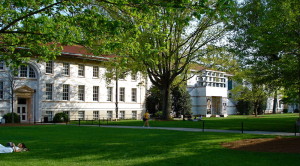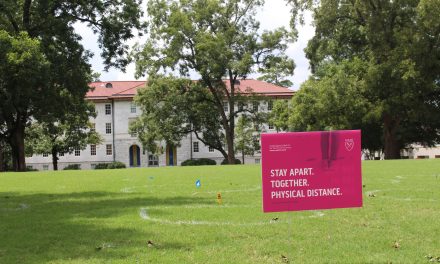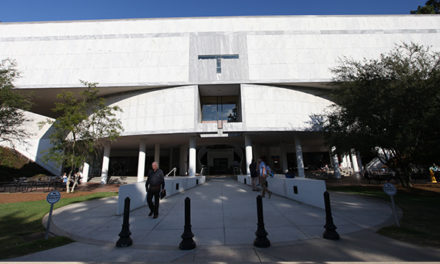Indicating hope that the end of the pandemic is in sight, Emory College announced in mid-March that 70% of fall 2021 classes will be held in person and University President Gregory Fenves announced a week later that all students are invited back to campus.
Although the fall plans seem like a leap toward normalcy, many protocols and guidelines are in place to mitigate potential COVID-19 outbreaks in classrooms.
The College’s plans assume the continuation of three conditions in the fall: students being unable to return to campus due to international travel restrictions or health reasons, the continuation of masking in classrooms and classrooms operating at 50% capacity, according to College Dean Michael Elliott. He said this decision was made after a careful consideration of anticipated public health guidance.
“We looked at the fall 2019 schedule and enrollment patterns of different courses, and then tried to map that on to our classroom capacity, and the capacity of the classroom of those classes based on schedule,” Elliott said. “We arrived at 70% as being something that we could achieve and still keep that 50% classroom capacity.”

Emory will welcome back all students for the fall 2021 semester. (Wikimedia Commons)
This semester, classrooms are operating at around 30% capacity with spaced out seating. Elliott said he expects increased capacity in fall 2021 to allow “roughly every other seat in the classroom” to be filled.
Even with the increased capacity, many of the College’s largest courses will be held virtually, Elliott said. For instance, Introduction to Anthropology, or ANT 101, which has a maximum enrollment limit of 180 students, will be conducted virtually in the fall, according to the Emory Course Atlas.
The ANT 101 enrollment limit also exceeds maximum potential classroom capacity. The largest College classroom is room 208 in White Hall, which can hold 136 students at 50% capacity, Associate Dean Jason Ciejka wrote in a March 30 email to the Wheel.
“Smaller seminars could expect to be in classrooms with a capacity of about 10 to 12,” Ciejka wrote.
The College has over 180 classroom spaces, but only 50 will be in use in the fall, Elliott noted. Most of the classrooms in use will be able to hold large numbers of students.
Elliott said that the College is looking into “non-traditional” classroom spaces, including areas in Glenn Memorial United Methodist Church and the Donna and Marvin Schwartz Center for Performing Arts, but other schools at the University are also interested in those spaces.
With a limited number of classrooms in use, the College is planning on using the entire class day to allow for as many in person courses as possible, a key distinction from the more concentrated pre-pandemic class schedules.
“The biggest difference that students will notice from pre-pandemic schedules is that the classes will be much more evenly distributed throughout the day,” Elliott said.
Similar to this year, most College courses will be 75 minutes or less. Longer classes will have a break to mitigate the risk of being in a class for too long, Elliott said.
Classroom size and capacity limits are not the only determining factors for whether a course will be taught in person or virtually. The College must also ensure there are enough courses offered online for students who are unable to be on campus for health or travel-related reasons.
“For most classes that have multiple sections … it’s likely that it’ll have at least one in-person class and one online class,” Elliott said.
“We will also work to ensure that they can enroll in courses so that they can make academic progress. That doesn’t necessarily mean that we can guarantee that they can enroll for an online version of every course they might want.”
The College is also taking learning-based considerations into account when determining which courses will be offered online. Elliott noted that some faculty members in the language departments are particularly motivated to conduct classes online for educational reasons, such as being able to tell how students are trying to pronounce words by seeing their mouths move on Zoom rather than being behind a mask in person.
Other circumstances that the College is incorporating into their rationale include guest speaker involvement, collaboration with colleagues at another university and cross registration with Oxford College, Elliott said.
“One of the interesting things about this last year is that students on this campus enrolled in classes with Oxford faculty and vice versa,” Elliott said. “We may be looking to offer particular classes that can serve everybody better if they’re open to both Oxford and Atlanta campus students.”
Given some of the advantages to online courses, Elliott said the College is considering offering online courses even after the pandemic completely ends. He noted that it will “feel very different” if a student elects to take a virtual course than being forced to because of the pandemic.
“I’ve heard students say that in some classes, they really like having access to recorded lectures … so I can see online versions of some of the science courses continuing online that facilitate that kind of learning,” Elliott said.
Despite challenges with online learning this year, Elliott emphasized that the College learned a lot about what contributed to an effective online learning experience and can give more attention to preparing online fall courses over the summer since there are fewer of them.
“The big thing, though, that will change is students won’t be taking all of their courses online and they’ll be living in residential learning communities whether they’re on campus or off campus and have access to all of the resources of those communities,” Elliott said. “It will be a very different experience.”
Editor-in-Chief | Matthew Chupack (he/him, 24C) is from Northbrook, Illinois, majoring in sociology & religion and minoring in community building & social change on a pre-law track. Outside of the Wheel, Chupack serves on the Emory College Honor Council, is vice president of Behind the Glass: Immigration Reflections, Treasurer of Omicron Delta Kappa leadership honor society and an RA in Dobbs Hall. In his free time, he enjoys trying new restaurants around Atlanta, catching up on pop culture news and listening to country music.






